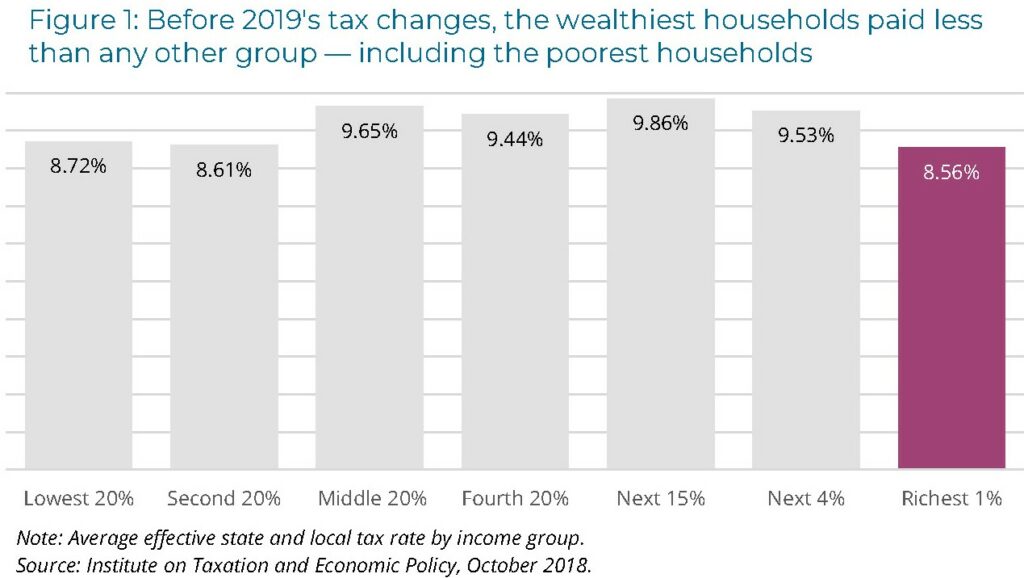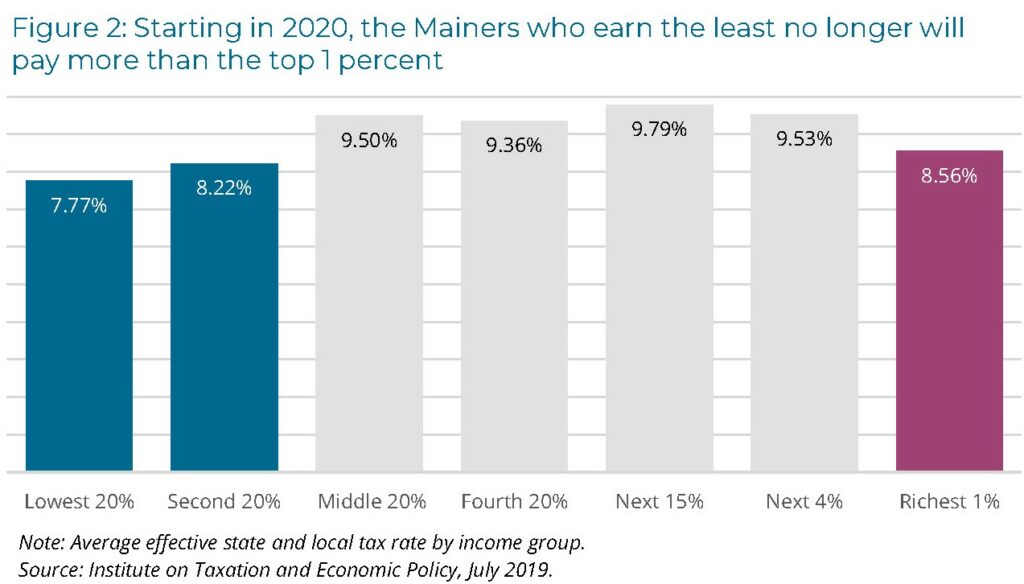By Sarah Austin, Maine Center for Economic Policy
Lawmakers in Maine this year took bold steps toward making the state’s tax system fairer. Their actions demonstrate that political will can dramatically alter state tax policy landscape to improve economic well-being for low-income families while also ensuring the wealthy pay a fairer share.
Maine, like the vast majority of other states, has had an upside-down tax code for decades. At least as far back as 1996, Mainers with low incomes have paid a larger share of every dollar they earn to state and local taxes than the top 1 percent.
Not anymore. Starting in 2020, the bottom 40 percent of Mainers by income will no longer pay more than those who earn the most.
Three major tax policy changes this year—expansions of the state’s Earned Income Tax Credit and two property tax relief programs—brought Maine to this milestone for tax fairness. Both of these are progressive policy options target families who need it most. This legislative milestone is also the culmination of years of successful tax policy efforts by the Maine Center for Economic Policy and our partners and allies inside and outside the Maine Legislature.
This victory for tax fairness will make a real difference for low- and moderate-income families. Instead of worsening inequality, Maine’s tax code will help lift families out of poverty. And refundable tax credits like the EITC will provide more money to low- and middle-income families so they are better able to cover their bills.
Progress in the face of anti-tax headwinds
From 2011 through 2018, Maine Gov. Paul LePage pushed an aggressive anti-tax agenda. While his ultimate goal—eliminating the state’s income tax—failed, he nevertheless enacted several rounds of income tax cuts that primarily benefitted the wealthiest households in Maine.
The LePage tax cuts made our state tax code less fair and made it harder to fund priorities such as education, local services, and health care, which create opportunity for low- and moderate-income households.
But even as Governor LePage slashed income tax rates, MECEP successfully advocated for tax policies that mitigated the damage and laid the groundwork for 2019’s tax fairness milestone:
- 2013: Creation of a refundable Property Tax Fairness Credit. The credit is available to low-income families who pay a disproportionate amount of their income to property taxes or rent. It helps reduce the average state and local tax rate for families at the bottom of the income distribution and boosts state income tax refunds for those families. The Legislature expanded the maximum credit in 2017 and 2018.
- 2015: Making Maine’s EITC refundable. The EITC at the federal and state level were already proven-effective policies to reduce poverty and boost incomes for working families. Refundability supercharged the credit, providing even more extra cash for families who have to make ends meet on low incomes
- 2015: Creating a refundable Sales Tax Fairness Credit. Maine’s sales tax is the most regressive tax in the state, with the bottom 20 percent of Mainers paying nearly nine times more as a share of income than the top 1 percent. The Sales Tax Fairness Credit refunds some of the sales tax paid by low-income families.
- 2015: Expanded Homestead Exemption. The Homestead Exemption reduces property taxes on primary residences by shielding a portion of the home’s value from property taxes. While it is not explicitly targeted at low-income families, the exemption represents a larger share of the value of modest homes compared to more extravagant ones, so a robust Homestead Exemption still contributes to tax fairness.
While the state still suffered a dramatic loss of revenue from 2011 through 2019, these policies reduced the harm of Gov. LePage’s income tax cuts by providing targeted benefits for low- and moderate-income families.
Building on a strong foundation
By 2018, only five states and the District of Columbia had fairer tax codes than Maine based on ITEP’s Inequality Index, which ranks states according to how their tax codes exacerbate—or mitigate—inequality.
Nevertheless, Mainers who earned the least still paid a larger share of their income to state and local taxes than the top 1 percent.

In 2019, Maine built on recent changes in the tax code to:
- More than double the Earned Income Tax Credit. The Legislature increased Maine’s EITC, from 5 percent of the federal credit to 12 percent, and expanded eligibility to low-income 18- to 24-year-olds without children. More than 100,000 Maine households will benefit.
- Increase the Property Tax Fairness Credit. Lawmakers made more households eligible for the credit by expanding eligibility to income up to $65,000, from a previous cap of $54,167. Roughly 36,000 households will receive a larger credit.
- Increase the Homestead Exemption. Lastly, policymakers increased the Homestead Exemption from $20,000 to $25,000. Roughly 306,000 households will benefit.
This package of fairness-oriented tax policies pushed down the average effective state and local tax rate for the bottom 40 percent of households, who will no longer pay more than the top 1 percent.

What’s next for Maine?
Fairness is just one element of responsible tax policy. As we celebrate this year’s milestone for tax fairness in Maine, MECEP remains focused on ensuring the state has adequate revenue to meet its obligations and remove barriers to prosperity for Maine families.
Even the fairest tax code is inadequate if it doesn’t raise the resources necessary to pay for investments that support healthy families and thriving communities.
Income tax cuts that primarily benefitted the wealthy cost Maine hundreds of millions of dollars every year, leaving the state unable to fully fund public schools and local services. Even as our tax code has gotten fairer, classrooms remain underfunded and municipal budgets are stretched to the breaking point.
In the next few years, Maine must raise additional revenue without undermining its victories in tax fairness. Still, this bold step forward for Maine families is a reminder that more progressive state tax policy is possible.
Sarah Austin is MECEP’s policy lead on tax and budget issues. She conducts research and impact analyses, writes educational materials, and collaborates with partners. Sarah is skilled in data collection, research, and statistical and policy analysis. Sarah holds a master’s of public affairs from the University of Wisconsin-Madison’s La Follette School of Public Affairs and a bachelor’s of science in environmental policy from Maine’s Unity College.




